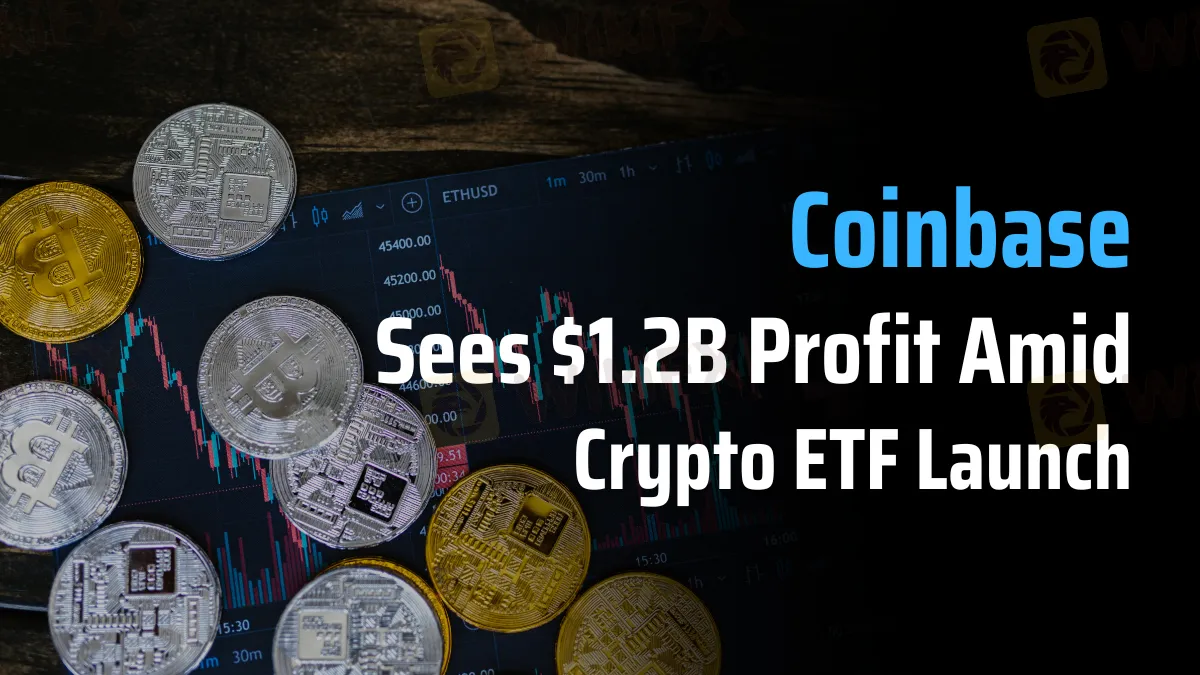简体中文
繁體中文
English
Pусский
日本語
ภาษาไทย
Tiếng Việt
Bahasa Indonesia
Español
हिन्दी
Filippiiniläinen
Français
Deutsch
Português
Türkçe
한국어
العربية
Coinbase Sees $1.2B Profit Amid Crypto ETF Launch
Abstract:Coinbase achieves a first-quarter profit of $1.2 billion following the launch of bitcoin ETFs and increased trading volumes.

Coinbase Global (COIN.O) announced a substantial improvement in its financial situation, generating over $1 billion in earnings in the first quarter. The loss recorded over the same time last year stands in sharp contrast to this. Gains in volume from trading cryptocurrencies after the first exchange-traded funds (ETFs) tracking Bitcoin were listed in the United States contributed significantly to the profit boom.
After a loss of $79 million, or $0.34 per share, the previous year, the company recorded a net income of $1.2 billion, or $4.84 per share, for the quarter ending March 31. Despite a positive results release, Coinbase shares dipped 2.5% in after-hours trading. The decrease happened after the typical trading session witnessed a roughly 9% increase.
Paul Marino, Chief Revenue Officer of GraniteShares, commented on the stock's performance. “Despite a very solid report, the stock traded lower after hours, with concerns that trading volumes might decrease based on the downward movement in bitcoin prices,” according to the analyst.

The trading environment underwent significant changes in January when the United States Securities and Exchange Commission approved the establishment of six Bitcoin-related ETFs. Bitcoin values rose to a new all-time high of about $72,000 in March after the acceptance, which came after a ten-year battle with the industry. The end outcome was a renewed interest in digital assets. Coinbase's trade volume increased from $145 billion in the same quarter last year to $312 billion this quarter as a result.
Coinbase CEO Brian Armstrong attributed the company's financial health to its deliberate focus on preserving a low-cost structure while pursuing innovation during a teleconference with investors. “Continually innovating while keeping our cost structure low is paying off,” Armstrong added.
Still, larger economic worries have driven recent market sentiment shifts. Investors' expectations of interest rates have altered significantly in response to the US Federal Reserve's desire to keep rates high, which was hinted at during its most recent policy meeting. This has tempered the early excitement for cryptocurrencies earlier in the quarter.
Even with these challenges, Coinbase has increased interest income. Cryptocurrency startup Circle, manages USD Coin (USDC), a stablecoin that pays the company interest on reserves. Coinbase may generate steady interest revenue since USDC is intended to be a stable price token supported by dollars and similar assets. The firm's interest and financing fee revenue increased from $43.3 million in the preceding year to $66.7 million in the first quarter.
The most recent financial results from Coinbase highlight the potential and challenges in the rapidly developing digital asset market as the bitcoin sector grows.

Disclaimer:
The views in this article only represent the author's personal views, and do not constitute investment advice on this platform. This platform does not guarantee the accuracy, completeness and timeliness of the information in the article, and will not be liable for any loss caused by the use of or reliance on the information in the article.
Read more

Vantage Markets Review 2025: Trusted Forex and CFD Trading Since 2009
Explore our 2025 Vantage Markets review! A trusted Sydney-based broker since 2009, offering forex, CFDs, low spreads, global regulation, and 24/7 support. Trade from $50!

IronFX vs Exness Review 2025: Comprehensive Broker Comparison
Explore an in-depth comparison between IronFX and Exness. Compare licensing, features, regulation, trading platforms, and customer service for smarter trading decisions.

eToro Review 2025: Top Trading Opportunities or Hidden Risks?
Is eToro a trustworthy broker or a scam in 2025? Explore its regulations, user reviews, and reputation to decide if it’s safe for trading forex, stocks, and crypto. Read now!

ASIC Urges Financial Licensees to Fix Register Errors Before 2026 Deadline
ASIC has warned AFS licensees to urgently correct errors on the Financial Advisers Register, with over 4,600 advisers still not meeting the 2026 qualification standard.
WikiFX Broker
Latest News
How much money will you earn by investing in Vantage Broker?
IronFX vs Exness Review 2025: Comprehensive Broker Comparison
Fraudsters Are Targeting Interactive Brokers' Users with Lookalike Emails
Interactive Brokers: Global Office Visits and Licensing Details
Top Tips to Choose the Best Forex Broker in 2025
SEBI Notifies New F&O Rules for Investors - New Derivative Trading Limits & More Amendments
U.S. Jobs Data Released: A Potential Boost for Gold Prices
SkyLine Guide 2025 Malaysia: 100 Esteemed Judges Successfully Assembled
Everything you need to know about ADSS
Vantage Markets Review 2025: Trusted Forex and CFD Trading Since 2009
Currency Calculator


